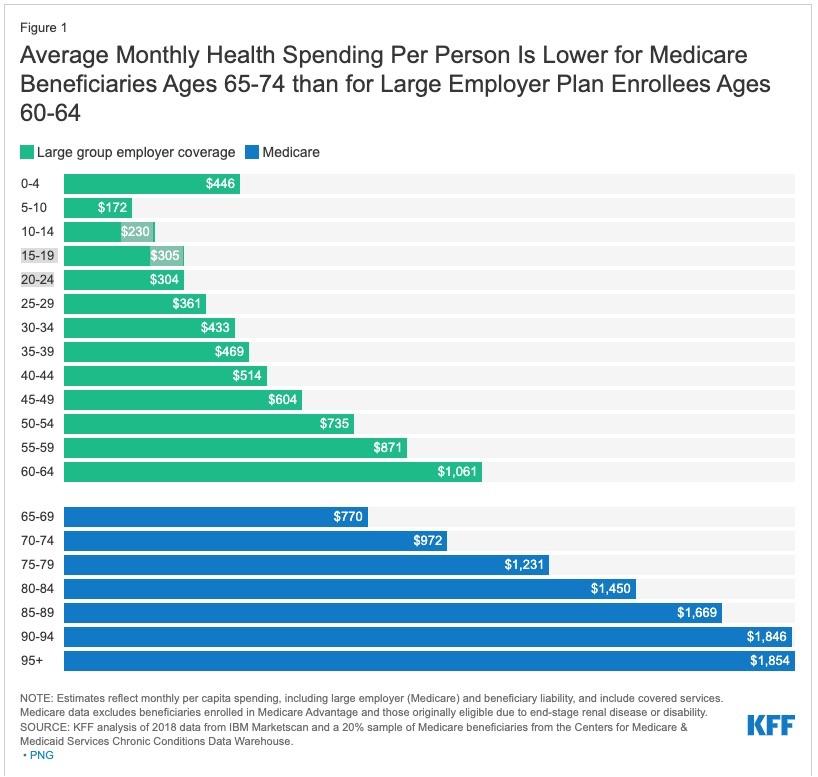KFF: Why hospitals are so strongly opposed to lowering the Medicare age in one chart

With the urgent push by an unusually wide array of Congressional Democrats in both the House and Senate to lower the eligibility age of Medicare from 65 to 60 (or 55), the Kaiser Family Foundation posted an analysis of what that might look like in real-world terms for the newly-eligible enrollees, and the results, while not surprising, are pretty striking when presented the way they are in the KFF study:
Lowering the age of Medicare eligibility from 65 to 60 would likely lead to lower revenues for hospitals, physicians, and providers who deliver care to 60-64 year olds. Provider payment rates from private plans tend to be considerably higher than those paid by Medicare; for example, large employer plans pay between 1.6 to 2.5 times more than Medicare for the same type of inpatient admission. Over time, the payment rate differential has been increasing. If private plans paid the same rates as Medicare, their spending would decrease by 41%, or over $350 billion in 2021.
The flipside of lowering provider reimbursement to Medicare payment rates for the 60-64 age cohort is the potential to reduce health care spending for people who shift from large employer plans to Medicare, potentially saving money for people, employers, and the federal government in the form of reduced tax subsidies for employer coverage.
...While health care spending increases with age within a given payer type, our analysis shows substantially higher per person spending among 60-64 year olds in large employer plans than among 65-69 year olds in Medicare, primarily reflecting the differences in payment rates noted above.
Put simply, while there's wide variables at play, shifting everyone age 60-64 from private coverage to Medicare would result in hospitals, doctors, clinics etc. seeing their gross revenues drop by perhaps 40% from that population, give or take. Of course there's a difference between making Medicare mandatory (as it effectively is for most seniors) and making it optional; not all ~20 million or so Americans in the 60-64 age bracket would necessarily make the move. Still, it's the chart which is so eyebrow-raising:
A crude eyeball-reading of this chart suggests that healthcare spending for 60-64 year olds would drop from $1,061/month down to somewhere around $600/month if they were paying Medicare rates, or from $871/month down to around $500/month for those 55-59. The flipside of this is that those age 65-69, for whom average spending is around $770/month today, would be more like $1,250/month or so at private insurance rates.
Of course, it's not quite that simple. Taking away up to ~40% of the revenue from this population from hospitals and other healthcare providers obviously wouldn't go over very well. They'd have two choices: Either accept the revenue loss (yeah, right!)...or attempt to jack up private insurance reimbursement rates even more to make up the difference.
(Note: I'm not saying they would actually have to jack up private insurance rates to stay afloat, I'm just saying they would claim that they have to. In some cases they'd be correct; in others, not so much).
Any savings that accrue to the consumers or society in general comes out of someone’s income. If we think about how hospitals and provider groups conceive of their group interest, they have a clear interest in moving people from low payment to them insurance statuses to high payment to them insurance statuses. This means supporting Medicaid expansion as it moves people from cash, hope and a prayer payment level to mostly reliable and mostly on-time-ish Medicaid payments. It also means being neutral or indifferent to policy proposals that redesignate people within the same payment strata. It really means being willing to go to the mat in opposition to policy changes that move people from high payment strata to lower payment strata.
...The public option in 2009-2010 was killed by intense lobbying by numerous state hospital associations. They are trusted and they are powerful. They saw their interests to be for an expansion of public coverage to massively shrink their bad debt problem without having the vast majority of the coverage expansion occurring at administratively set prices of either Medicaid Expansion or Medicare linked public option prices.
I think that a similar lobbying campaign will occur if there is a serious push to move Medicare age eligibility from 65 to 60 or 55. And I would bet on the hospitals winning as they have a definitive, particular and large point of pain while the benefits are far more diffuse.
I agree...which is why, while I strongly support including the addition of dental, vision & hearing coverage to Medicare, along with adding a prescription drug spending cap, I just don't see lowering the age itself as happening in the current environment. The Dems trifecta majority is right on the edge, and even getting the items I list above through is pushing the envelope as it stands.




